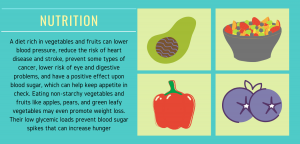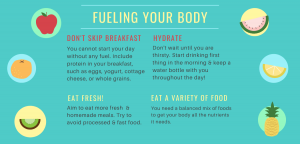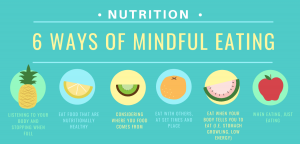Student Health & Counseling Center
Home » Resources » Student Health & Wellness » Physical Wellness » Nutrition
MenuPhysical Wellness
- The 2015-2020 Dietary Guidelines for Americans (CDC) recommend that an individual eats roughly 1.5-2 servings of fruits per day and 2-3 servings of vegetables per day.
- Caloric guidelines are primarily dependent on age and activity level. Please refer to this chart to see how many calories you should be eating (USDA guidelines).
- Water intake is also dependent on size. To find out the daily water intake in ounces, multiply your weight by .5. (EX: 150lb x 0.5 = 75 oz. per day) If you are an active individual, you need to increase your intake from your first calculation. Further instructions for active calculation can be found here.
Benefits of Adequate Nutrition
A diet rich in vegetables and fruits can lower blood pressure, reduce the risk of heart disease and stroke, prevent some types of cancer, lower risk of eye and digestive problems, and have a positive effect upon blood sugar, which can help keep appetite in check. Eating non-starchy vegetables and fruits like apples, pears, and green leafy vegetables may even promote weight loss. Their low glycemic loads prevent blood sugar spikes that can increase hunger (Harvard, T.H. Chan School of Public Health).
On-Campus Resources
- Campus Dining: Dining options are available in the WUC, Hamersley Library, and in Valsetz.
- WOU Food Pantry: If you are struggling financially and do not have the means to buy food, please visit the WOU Food Pantry. They offer a variety of meat, fruits, vegetables, and other meal options. Please refer to their website for hours.
Off-Campus Resources
- Ella Curran Food Bank: This food bank is located in Independence, but has a wide selection of choices. Please refer to their website for hours.
- Waremart: Grocery store located in Independence.
- Food Hero: Simple, nutrition-dense food recipes




